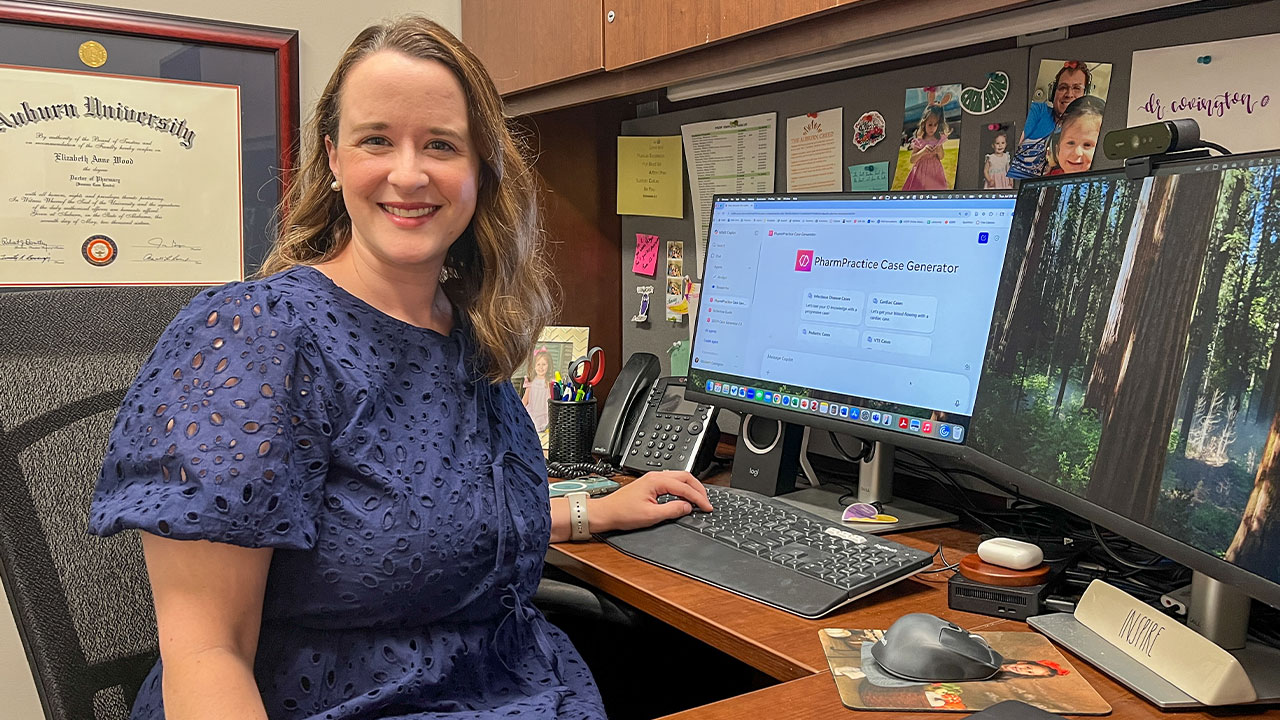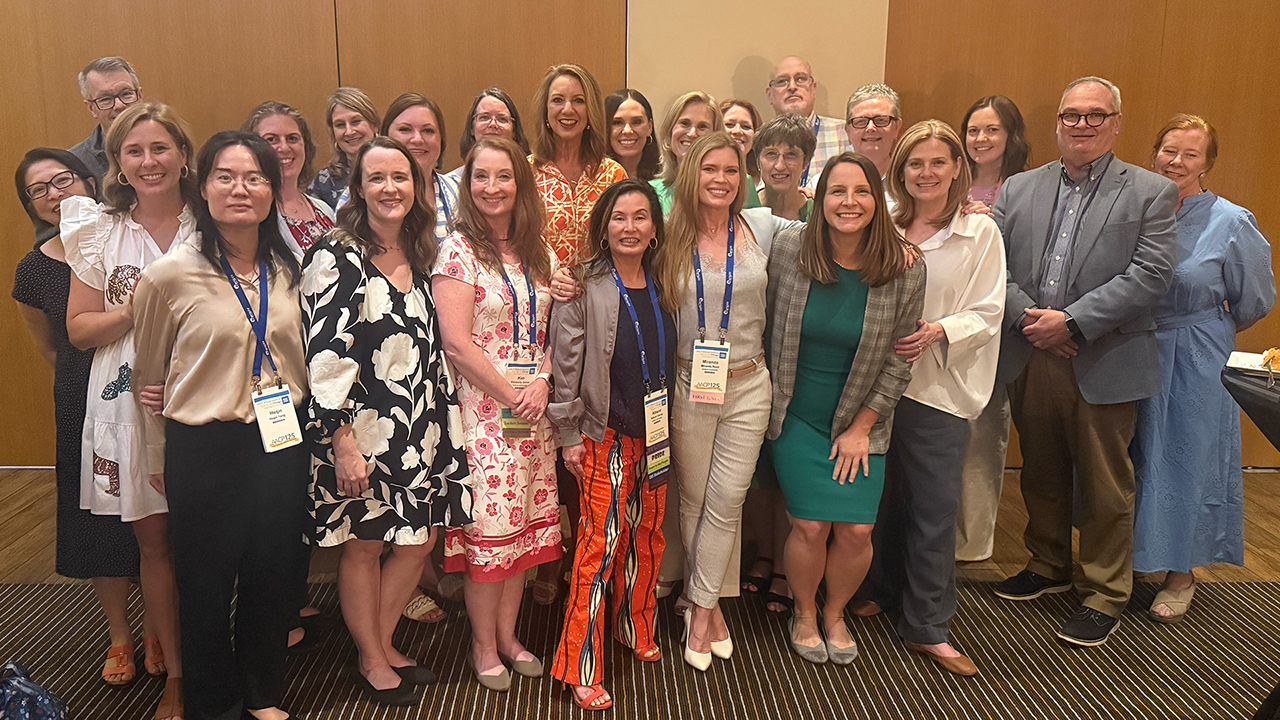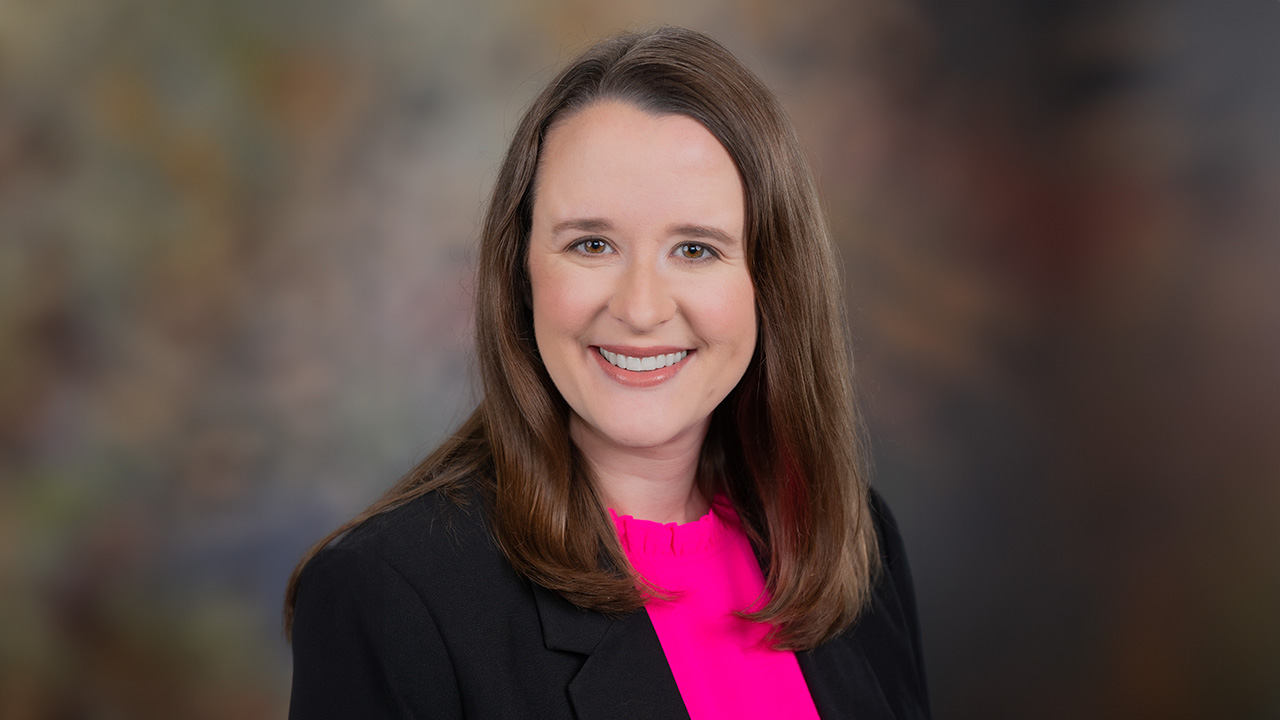content body
Elizabeth Covington, a board-certified infectious disease pharmacist, is devoted to combating elusive microbes.
But she’s also captivated by a different kind of “bug” — artificial intelligence (AI) — and it’s more than welcome in her classroom in Auburn University’s Harrison College of Pharmacy.
For the associate clinical professor and 2016 Pharmacy alumna, AI is a transformative tool reshaping how students learn and how they deliver patient care.

This is the custom GPT Elizabeth Covington created.
One of her standout innovations is a custom GPT — essentially a personalized version of OpenAI’s ChatGPT — that generates progressive disclosure patient cases.
Students ask the GPT questions, and it reveals patient information — chief complaint, medical history, lab results, imaging, etc. — one question at a time. This mimics real-world clinical decision-making.
As students work through each case, they sharpen critical thinking and problem-solving skills — and learn to evaluate AI-generated content.
“Sometimes the data is impressively realistic, and other times it’s a teaching moment about AI’s limitations,” Covington said. “I’ll have students check the output and develop their own recommendations for each case.”
Earning attention
Covington said her students’ response to the use of AI was “overwhelmingly positive.” She’ll present a poster at an annual meeting of infectious disease professionals in October, showcasing how the AI-driven case studies have boosted students’ perceptions of their critical thinking and patient work-up skills.
“One student said it felt like a simulation of a real hospital stay,” Covington recalled. “That’s exactly the kind of immersive learning I’m aiming for.”
The American Association of Colleges of Pharmacy has noticed this work, recognizing her last year with its Innovation in Teaching Award and this year with its Emerging Teaching Scholar Award.
Both honors are meaningful to Covington, who began teaching in 2017.
“This recognition affirms that thoughtful, evidence-based teaching — and the scholarship that supports it — truly matters,” she said.
Covington calls it a “dream come true” to be back at her alma mater, surrounded by a community that values innovation in teaching.
“Being recognized is encouragement to keep growing and contributing to Auburn’s culture of scholarly teaching,” she said.
The road back
Covington grew up in Birmingham, Alabama, and earned a chemistry degree from Furman University in South Carolina — breaking a long-standing family tradition.
“I was actually the first person in my family not to attend Auburn for undergrad,” she admitted. “I come from a long line of graduates — grandparents, parents, uncle, sister.”
Fortunately, Covington had a chance to redeem herself. After Furman, she sought a Doctor of Pharmacy degree — at only one place.
“I knew the value of an Auburn degree and was excited to become a part of the Auburn Family myself,” she said.
Following a post-graduate residency in Tuscaloosa, Alabama, Covington spent six years at Samford University’s McWhorter School of Pharmacy as an assistant professor. Then, the Plains called her back.
With her own Auburn degree, Covington became eligible for an honor her sister earned in 2022. Emily (Wood) Traylor was part of the inaugural class of the Auburn Alumni Association’s 20 Under 40, launched by the Young Alumni Council; Covington is part of the 2025 class. Traylor is a two-time alumna, though, but who’s counting?
A dream job
As an associate clinical professor, Covington wears many hats. She teaches in the classroom and in clinical settings, primarily with fourth-year students during their rotations at East Alabama Health.
There, she also leads a pharmacist-driven service that reviews infectious disease test results that come in after patient discharge. The initiative recently received funding through Auburn’s Research Support Program, allowing her to study its impact more formally.
“It’s about making sure patients are on the right antibiotics and coordinating care with providers and pharmacies,” Covington said.
Her clinical and research interests converge around infectious diseases and antimicrobial stewardship. She’s passionate about educating the public and health care professionals on the dangers of antibiotic overuse. She’s currently working on a grant proposal to explore strategies for reducing unnecessary antibiotics at hospital discharge.
In a recent commentary for the American College of Clinical Pharmacy, Auburn Pharmacy's Elizabeth Covington explored current and future roles for artificial intelligence (AI) in pharmacy practice, emphasizing its potential to enhance communication and learning when paired with expert oversight.
Read itBranching out
Covington has also integrated AI into an elective on antimicrobial stewardship. Students create infographics or visual abstracts summarizing infectious disease literature and use AI to evaluate and grade their work.
“It’s about showing them how AI can ethically supplement their work,” she said.
Covington is currently developing an AI-powered “study bot” to help students master infectious disease content — a notoriously challenging area in pharmacy education.
She believes AI has a place in the field of pharmacy, but only when used responsibly.
“We need to be aware of its limitations,” Covington said. “I want to ensure my students understand the ethical and appropriate use cases of it, because AI is here to stay, and we need to embrace that.”
Are you really allergic to penicillin?
Covington also penned this piece, explaining why there's a good chance you're probably not allergic to penicillin and how you can find out for sure.
Expert advice






